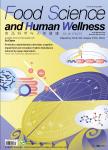Encapsulated ferric pyrophosphate improves intestinal inflammation and gut flora disorder in suckling rats with iron deficiency anemia
作者机构:College of Food Science & Nutritional Engineering, China Agricultural University Key Laboratory of Precision Nutrition and Food Quality, Department of Nutrition and Health, China Agricultural University Food Laboratory of ZhongyuanLuohe
出 版 物:《Food Science and Human Wellness》 (食品科学与人类健康(英文))
年 卷 期:2024年
核心收录:
学科分类:1002[医学-临床医学] 100201[医学-内科学(含:心血管病、血液病、呼吸系病、消化系病、内分泌与代谢病、肾病、风湿病、传染病)] 10[医学]
基 金:the National Natural Science Foundation of China (NO.32001676) the Young Elite Scientists Sponsorship Program by CAST (NO.2022QNRC001)
摘 要:The prevalence of iron deficiency anemia (IDA) remains high in infants, resulting in growth retardation, neurodevelopmental impairment, immunodeficiency and other irreversible injuries. Efficient and safe iron supplementation for infants has been the goal of recent research. This study aims to investigate the effect of encapsulated ferric pyrophosphate (FePP) on intestinal inflammation and gut microbiota in IDA suckling rats. Newborn Sprague Dawley rats were gavaged with low and high doses of FePP and FeSO4(2 and 10 mg Fe/kg BW, respectively) during postnatal days 2-14. Results showed that FePP supplementation was as effective as FeSO4in promoting growth, alleviating anemia and restoring body iron levels. Both low and high doses of FePP could significantly down-regulate the expression of pro-inflammatory cytokines in the colon to the level similar to that in the Ctrl group (P 0.05). However, the high dose of FeSO4did not show a down-regulation effect. Compared with the Ctrl group, IDA caused a disturbance of gut microbiota composition in suckling rats, and FePP could restore this dysbiosis. Besides, FePP was more beneficial than FeSO4in increasing the abundance of beneficial bacteria such as Bacteroides and Akkermansia. Spearman s correlation analysis showed a correlation between gut microbiota and biochemical indicators such as iron status, pro-inflammatory cytokine expression, and oxidative stress level. Overall, these findings suggested that FePP could effectively improve IDA, and is more effective than FeSO4in alleviating intestinal inflammation and regulating gut microbiota, which provides a basis for the application of new iron fortificant in infant formula.



